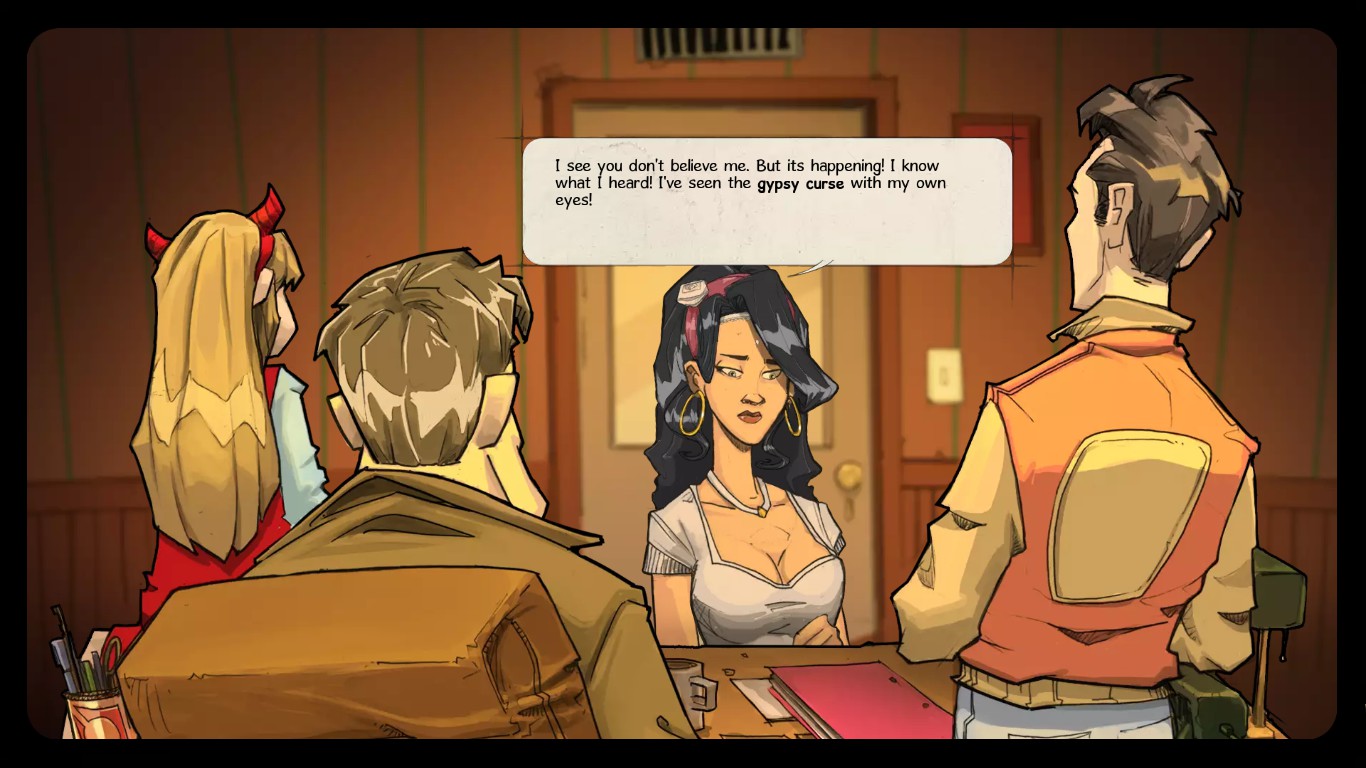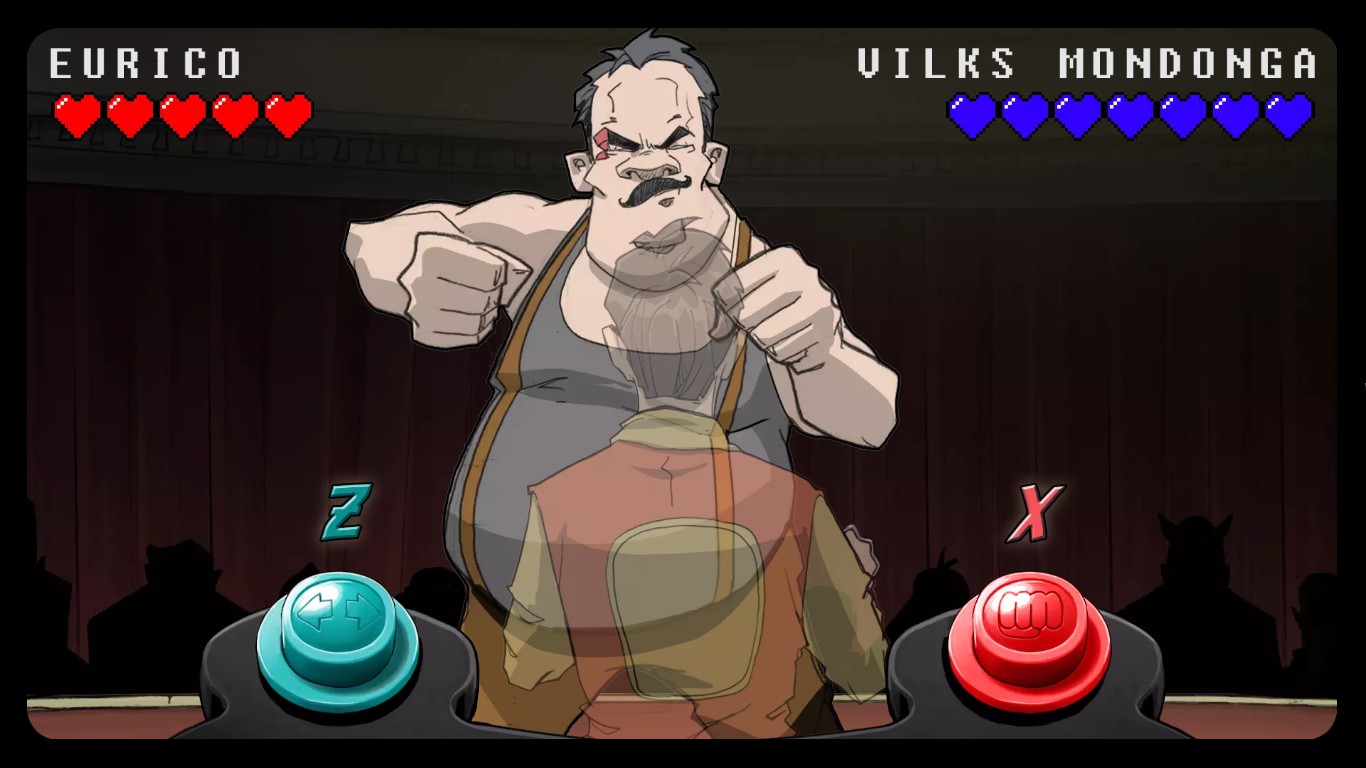Review | The Interactive Adventures of Dog Mendonça and Pizzaboy
Based on a series of graphic novels that share the latter half of its name, The Interactive Adventures of Dog Mendonça and Pizzaboy lets you take control of a new chapter of their story in the form of an animated point-and-click adventure.
After successfully raising the $30,000 required from over a thousand backers for their Kickstarter campaign back in 2014, OKAM Studio make sure that the first thing to greet you on the main menu is the case files folder. This is a nod to some of the highest-paying backers: a series of notes about cases and characters that they created. If you weren’t aware of the Kickstarter campagin, you could mistake this for plot-related information. It isn’t, but it still serves as a kind of introduction to the theme of the game.
That being said, the game doesn’t give very much introduction to the main characters before the plot descends and the story begins. For those who have read the novels this won’t present much of a problem, but it’s likely that newcomers will be left wondering why they should care about the characters at all.
You’ll have to care soon enough, though, as you and Dog Mendonça take on the case of a woman called Nadia fleeing a gypsy curse. You’ll be playing as Dog’s unpaid intern, Eurico the ex-pizzaboy; since Dog (who is, sadly, human) appears more interested in flirting than getting to the bottom of the situation, it’s up to you to get information out of her.

This is the first of one of the game’s features: the ability to question or interrogate characters at different points in the story. You must gauge the reaction of the person you’re questioning and choose the appropriate line of enquiry – a process which can be hit-and-miss but carries no penalty for incorrect lines of enquiry. When every piece of information has been extracted from the conversation, the story can advance to the next stage.
That next stage comes in the form of exploration – the part that puts the ‘point-and-click’ in the adventure. Travelling between a handful of detailed hand-drawn scenes, you can interact with objects and manipulate combinations of them to achieve the current story goals. The scenes aren’t over-cluttered with items, so most of the struggle is in working out how the objects interact with each other and the environment.
Finding objects to begin with isn’t too much of a hassle, as mouseover text appears whenever you hover over something you can use. There’s also a right-click feature (that isn’t mentioned at all during the game) which highlights objects, but it doesn’t seem to highlight everything (the ability to highlight interactable NPCs would have been useful later on). Right-click can also be used for some left-click actions, which can be annoying if you click the scene boundaries and find yourself teleported to the next scene along.
In many point-and-click titles, some items are only there for show, revealing humorous quips or references to other games when manipulated. This is also the case here, but the variety of interactions feels sadly lacking. There are three visual interaction options for each item, represented by the eye, mouth and hand symbols. More often than not, these stand for look at, speak to and pick up. However for many items, the mouth interaction dialogue will simply read, ‘Yuck. Imagine licking that,’ which blurs the meaning of the symbol, gets somewhat repetitive and feels like a missed opportunity for more humorous interactions.

Not only that, but if you find yourself clicking on each interaction for an object (either because you’re lost or you want to see what happens), you’ll find that the dialogue for hand and mouth interactions is often almost identical, adding even more repetition to items which could be more interesting.
The difficulty of each scenario in The Interactive Adventures of Dog Mendonça and Pizzaboy seems just about right, with the use of items following a challenging, but logical order. Aiding you in this is the notebook, which you can find in your jacket pocket alongside all the items you’ve picked up. It acts as a hint book, reminding you of the steps you need to take to complete the scenario, but not telling you the direct solution. Everything it tells you can be found out somewhat easily via character dialogue and item interactions, so it’s most useful if you step away from the game and can’t remember where you were when you come back.
While the act of piecing items together is fun in itself, the enjoyment is let down a little by the speed at which you travel between scenes. Eurico strolls at a more than leisurely pace across the screen, which can be painful to watch as you travel from one item to another and back again. Other games offer a double-click instant travel option, but Dog Mendonça brings no such relief, with the unfortunate effect of slowing down the game’s pace.
Not content with its existing features, Dog Mendonça also includes a boxing minigame at certain points in the story. What may annoy people who were expecting a standard point-and-click all the way through is that winning at least one of these fights is mandatory to complete the game. It’s relatively simple to get the hang of though, reacting to the body language of your opponent in simple quick time events, but they spring upon you somewhat unexpectedly at first with no instruction. This makes it essential to observe your opponent’s behaviour and learn when to strike, hoping you do so before running out of health.

The story itself is quite engaging – worth overcoming any frustration that the boxing matches may introduce. Come the end, you may not feel any particular connection to the characters, but you should be glad to see the story resolved in a fitting manner. It is quite a shame that you don’t get more interaction with the other characters; although they accompany you for a large portion of the game, Pazuuk never speaks and Gargoyle only has a decent amount of dialogue towards the end. It would have been interesting to see their characters more obviously involved in the story to flesh out their characters and hint at why they’re there.
There is one stumbling block holding the story back, though: the English voice acting isn’t about to win any awards. While many voices are decent, some are almost robotic, others come across as overly cheesy and all of them speak very slowly. For a game that in places appears unsuitable for children, the slow speech makes it seem as if it was written for them, including the jokes. Some of the dialogue itself seems unnatural and you may find yourself skipping the audio to focus solely on text, which does have a few errors itself.
Coupled with the fact that the cutscene animations aren’t especially animated (reverting to ‘talking heads’ for the most part), the cutscenes and the story as a whole feel like they’re missing something to make it special. The music isn’t bad, but you need to turn the voice volume down a good deal before it becomes noticeable and there’s a fair chance you’ll be skipping through conversations too fast to hear much of it anyway. The shame here is two-fold: the atmosphere feels almost hollow and the soundtrack isn’t even available in Steam’s music player to listen through again.
So overall, although the story of Dog Mendonça is entertaining and the puzzles are just challenging enough, a few flaws let it down. The slow walking speed may make it too frustrating to survive multiple playthroughs and the sheer brevity of the story doesn’t help this. With content that only adds up to three or four hours, mediocre voice acting and an £11 price tag, you may not find it a great deal of value for your money.
Comments are closed.